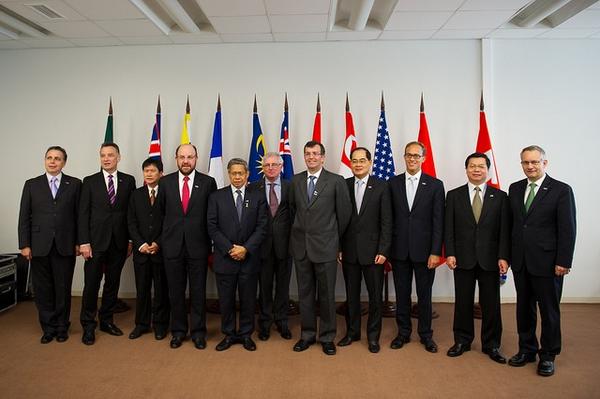A 14th round of Trans-Pacific Partnership free trade and investment negotiations begins in Virginia, U.S.A. this week as scorn for the agreement’s proposed intellectual property chapter piles up. To be fair, that scorn is almost entirely aimed at the United States’ positions on patent and other monopoly protections for pharmaceutical firms, as well as on copyright and Internet rules, which civil society observers and even other TPP negotiating countries see as regressive, unnecessary, dangerous to public health and harmful of online privacy and innovation.
Today, Amnesty International issued a statement saying the TPP “must ensure that any new rules on copyright and patents adhere to core principles of transparency and uphold human rights.” The human rights organization explained that the TPP looks too much like ACTA (the Anti-Counterfeiting Trade Agreement, rejected in a vote this summer by the European Parliament) in that it “neglects protections for fair use and standard judicial guarantees — such as the presumption of innocence — and includes copyright provisions that could compromise free speech on the internet and access to educational materials.”
“Moreover,” continues Amnesty’s statement, “draft TPP provisions related to patents for pharmaceuticals risk stifling the development and production of generic medicines, by strengthening and deepening monopoly protections.”
An article this week in the journal Nature explains the ways U.S. proposals on patents would affect drug costs and access to medicines in developing countries. First, they would force U.S.-style patent term extension onto other TPP countries, meaning the WTO-required 20-year patent term would automatically be lengthened by however long it took the pharmaceutical company to get approval for the drug. The TPP proposals would also pressure countries to recognize patents for marginally different, or “me too” drugs that are more expensive but offer no benefits beyond what cheaper generics can provide.
The Nature piece also explains the U.S. is considering asking TPP countries to accept 12 years of data protection for biologic drugs, based on large biological molecules, and to allow the patenting of plants and animals. In the first instance, this will make it much more difficult for smaller or generic firms to compete by locking away clinical trial data for 12 years. There could also be new rules in the TPP affecting how countries price drugs which would make it difficult for New Zealand to favour generics wherever possible as is the current practice, and as Canadian provinces are beginning to explore.
Another new group to comment on the TPP is the American Civil Liberties Union (ACLU), which last week called the deal The Biggest Threat to Free Speech and Intellectual Property That You’ve Never Heard Of.
“While the ACLU believes that the First Amendment can be served by effective IP protections that provide artists, writers, scientists and other innovators and creators with the incentive to innovate and create, any IP enforcement regime must be crafted carefully and after full public deliberation,” said the organization. “We’ll be digging into the leaked draft, and will continue to raise concerns with the USTR and Congress about both the secrecy of the negotiations and the substantive problems in the agreement. The patent laws must yield to the First Amendment, and it seems likely that the opposite has been true in the USTR’s efforts on TPP.”
The Electronic Frontier Foundation in the U.S., one of dozens of civil society groups that will present to TPP negotiators during a “stakeholder session” in Leesburg this week, has created an incredible info-graphic on the TPP, copyright, patents and the secrecy of the negotiations. The EFF is part of an international campaign against these aspects of the TPP, which includes OpenMedia.ca, a Canadian network focused on internet issues. OpenMedia developed an action alert on the TPP for the U.S.-based Citizens Trade Campaign, which the Council of Canadians is encouraging people to use to send TPP negotiators a message this Sunday, September 9.

It’s hard to tell where the Harper government will fall on these controversial issues when Canada is allowed to enter the TPP negotiations in December. Canada and the European Union have apparently not been able to approach the intellectual property rights chapter in the proposed Comprehensive Economic and Trade Agreement (CETA), but industry observers feel confident Canada will give in to some if not all of the EU’s demands for more monopoly rights to pharmaceutical firms.
It’s more difficult to say whether Canada can give the EU any more on copyright than it has already passed into new legislation this year. Whatever happens, the promises Canada makes to the EU in CETA will likely only provide a new floor that hard-nosed U.S. negotiators will try to raise again in the TPP in the interests of U.S. intellectual property rights holders.
What’s Harper up to? Award-winning journalist Karl Nerenberg keeps you in the know. Donate to support his efforts today.



